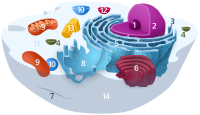
The role of RNA editing enzyme ADAR1 in human disease
Sign Up to like & getrecommendations! Published in 2021 at "Wiley Interdisciplinary Reviews: RNA"
DOI: 10.1002/wrna.1665
Abstract: Adenosine deaminase acting on RNA (ADAR) catalyzes the posttranscriptional conversion of adenosine to inosine in double‐stranded RNA (dsRNA), which can lead to the creation of missense mutations in coding sequences. Recent studies show that editing‐dependent… read more here.
Keywords: rna editing; rna; editing enzyme; disease ... See more keywords

OPRD1 Genetic Variation and Human Disease.
Sign Up to like & getrecommendations! Published in 2018 at "Handbook of experimental pharmacology"
DOI: 10.1007/164_2016_112
Abstract: The OPRD1 gene encodes the delta-opioid receptor, which has multiple functions including regulating reward pathways. The gene contains more than 2,000 verified genetic variants but only 2 currently have evidence for specific functions: rs1042114 disrupts… read more here.
Keywords: variation human; disease; human disease; genetic variation ... See more keywords

The Emerging Role of Long Noncoding RNAs in Human Disease.
Sign Up to like & getrecommendations! Published in 2018 at "Methods in molecular biology"
DOI: 10.1007/978-1-4939-7471-9_6
Abstract: Only a small fraction of the human genome corresponds to protein-coding genes. Historically, the vast majority of genomic sequence was dismissed as transcriptionally silent, but recent large-scale investigations have instead revealed a rich array of… read more here.
Keywords: long noncoding; emerging role; disease; protein coding ... See more keywords

The ubiquity of pleiotropy in human disease
Sign Up to like & getrecommendations! Published in 2017 at "Human Genetics"
DOI: 10.1007/s00439-017-1854-z
Abstract: Pleiotropy has long been thought to be a common phenomenon in the human genome; however, until recently appropriate data was unavailable to test this hypothesis. Prior studies focused on assessing the prevalence of pleiotropy in… read more here.
Keywords: pleiotropy; disease; ubiquity pleiotropy; catalog ... See more keywords

Studying human disease using human neurons
Sign Up to like & getrecommendations! Published in 2017 at "Brain Research"
DOI: 10.1016/j.brainres.2016.03.051
Abstract: Utilizing patient derived cells has enormous promise for discovering new drugs for diseases of the nervous system, a goal that has been historically quite challenging. In this review, we will outline the potential of human… read more here.
Keywords: human neurons; using human; disease; disease using ... See more keywords

Multiple pathophysiological roles of midkine in human disease.
Sign Up to like & getrecommendations! Published in 2020 at "Cytokine"
DOI: 10.1016/j.cyto.2020.155242
Abstract: Midkine (MK) is a low molecular-weight protein that was first identified as the product of a retinoic acid-responsive gene involved in embryonic development. Recent studies have indicated that MK levels are related to various diseases,… read more here.
Keywords: roles midkine; multiple pathophysiological; disease; pathophysiological roles ... See more keywords

Imprinted genes in clinical exome sequencing: Review of 538 cases and exploration of mouse-human conservation in the identification of novel human disease loci.
Sign Up to like & getrecommendations! Published in 2020 at "European journal of medical genetics"
DOI: 10.1016/j.ejmg.2020.103903
Abstract: Human imprinting disorders cause a range of dysmorphic and neurocognitive phenotypes, and they may elude traditional molecular diagnosis such exome sequencing. The discovery of novel disorders related to imprinted genes has lagged behind traditional Mendelian… read more here.
Keywords: exome sequencing; imprinted genes; clinical exome; conservation ... See more keywords

Cavefish as an evolutionary mutant model system for human disease.
Sign Up to like & getrecommendations! Published in 2018 at "Developmental biology"
DOI: 10.1016/j.ydbio.2018.04.013
Abstract: • Recent technological advances have renewed interest in exploring a wider share of the genetic and phenotypic variation present in nature read more here.
Keywords: model system; system human; cavefish evolutionary; mutant model ... See more keywords

Targeting lysosomes in human disease: from basic research to clinical applications
Sign Up to like & getrecommendations! Published in 2021 at "Signal Transduction and Targeted Therapy"
DOI: 10.1038/s41392-021-00778-y
Abstract: In recent years, accumulating evidence has elucidated the role of lysosomes in dynamically regulating cellular and organismal homeostasis. Lysosomal changes and dysfunction have been correlated with the development of numerous diseases. In this review, we… read more here.
Keywords: targeting lysosomal; research clinical; lysosomes human; targeting lysosomes ... See more keywords

Rare variant contribution to human disease in 281,104 UK Biobank exomes
Sign Up to like & getrecommendations! Published in 2021 at "Nature"
DOI: 10.1038/s41586-021-03855-y
Abstract: Genome-wide association studies have uncovered thousands of common variants associated with human disease, but the contribution of rare variants to common disease remains relatively unexplored. The UK Biobank contains detailed phenotypic data linked to medical… read more here.
Keywords: contribution; biobank; disease; ancestry ... See more keywords

Genetic associations of protein-coding variants in human disease
Sign Up to like & getrecommendations! Published in 2022 at "Nature"
DOI: 10.1038/s41586-022-04394-w
Abstract: Genome-wide association studies (GWAS) have identified thousands of genetic variants linked to the risk of human disease. However, GWAS have so far remained largely underpowered in relation to identifying associations in the rare and low-frequency… read more here.
Keywords: genetic associations; associations protein; disease; coding variants ... See more keywords